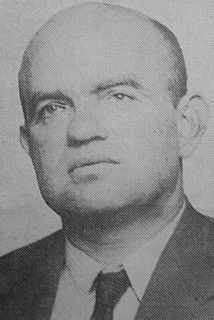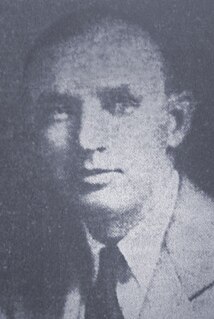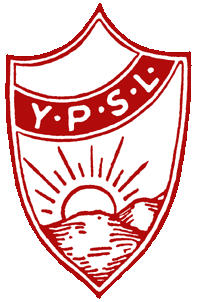
The Social Democratic Party of America (SDP) was a short-lived political party in the United States established in 1898.

Thomas Joseph "Tom" Mooney was an American political activist and labor leader, who was convicted with Warren K. Billings of the San Francisco Preparedness Day Bombing of 1916. Believed by many to have been wrongly convicted of a crime he did not commit, Mooney served 22 years in prison before finally being pardoned in 1939.

Charles Emil Ruthenberg was an American Marxist politician and a founder and head of the Communist Party USA (CPUSA).

The Preparedness Day Bombing was a bombing in San Francisco, California on July 22, 1916, of a parade organised by local supporters of the Preparedness Movement which advocated American entry into World War I. During the parade a suitcase bomb was detonated, killing ten and wounding 40 in the worst attack in San Francisco's history.

Benjamin "Ben" Gitlow was a prominent American socialist politician of the early 20th century and a founding member of the Communist Party USA. During the end of the 1930s, Gitlow turned to conservatism and wrote two sensational exposés of American Communism, books which were very influential during the McCarthy period. Gitlow remained a leading anti-communist up to the time of his death.

Alfred Wagenknecht was an American Marxist activist and political functionary. He is best remembered for having played a critical role in the establishment of the American Communist Party in 1919 as a leader of the Left Wing Section of the Socialist Party. Penrose served as Executive Secretary of the Communist Labor Party of America and the United Communist Party of America in 1919 and 1920, respectively.

Elisabeth Coit Gilman was an American socialist and civil liberties advocate.

Adoph F. Germer (1881–1966) was an American socialist political functionary and union organizer. He is best remembered as National Executive Secretary of the Socialist Party of America from 1916 to 1919. It was during this period that the Left Wing Section of the Socialist Party emerged as an organized faction. Germer was instrumental as one of the leaders of the SPA's "Regular" faction in orchestrating a series of suspensions, expulsions, and "reorganizations" of various Left Wing states, branches, and locals and thereby controlling the pivotal 1919 Emergency National Convention of the SPA, and thus forcing the Left Wing to establish new organizations of their own, the Communist Labor Party of America and the Communist Party of America.

The Lovestoneites, led by former General Secretary of the Communist Party USA (CPUSA) Jay Lovestone, were a small American oppositionist Communist movement of the 1930s. The organization emerged from a factional fight in the CPUSA in 1929 and unsuccessfully sought to reintegrate with that organization for several years.

Maximilian "Max" Cohen was an American socialist politician of the early 20th Century. Cohen held a series of important posts during the pivotal year of 1919, including Secretary of the Left Wing Section of the Socialist Party for Local Greater New York, Secretary of the Left Wing National Council, and business manager for the New York Communist. Cohen was also a founding member of the Communist Party of America in that same year.

Joseph Zack Kornfeder (1898–1963), AKA Joseph Zack, as "Joe" to friends, and sometimes surnamed "Kornfedder" in the press, was an Austro-Hungarian-born American who was a founding member and top leader of the Communist Party of America in 1919, Communist Party USA leader, and Comintern representative to South America (1930-1931) before quitting the Party in 1934. After his wife was arrested by the secret police during the Great Terror (1937-1938), Zack became a vehement Anti-Communist and testified before the Dies Committee (1939) and Canwell Committee (1948).

Charles S. "Sasha" Zimmerman (1896–1983) was an American socialist activist and trade union leader, who was an associate of Jay Lovestone. Zimmerman had a career spanning five decades as an official of the International Ladies' Garment Workers' Union. During the early 1970s, Zimmerman and Bayard Rustin were national Co-Chairmen the Socialist Party of America and the Social Democrats USA.

Roy Everett Burt was a Methodist clergyman and an American socialist politician and functionary. Burt is best remembered as the Executive Secretary of the Socialist Party of America from 1936 to 1939.
Abraham "Abram" Jakira was an American socialist political activist, newspaper editor, and Communist Party functionary. He is best remembered as one of the early Communist Party's factional leaders of the 1920s.
John Mahlon Barnes (1866–1934) was an American trade union functionary and socialist political activist. Barnes is best remembered as the Executive Secretary of the Socialist Party of America from 1905 to 1911, during which time he originated the idea of the party's 1908 "Red Special" campaign train on behalf of its Presidential nominee, Eugene V. Debs.

The Young People's Socialist League (YPSL), founded in 1907, was the official youth arm of the Socialist Party of America. Its political activities tend to concentrate on increasing the voter turnout of young democratic socialists and affecting the issues impacting that demographic group.
Secretary is a title often used in organizations to indicate a person having a certain amount of authority, power, or importance in the organization. Secretaries announce important events and communicate to the organization. The term is derived from the Latin word secernere, "to distinguish" or "to set apart", the passive participle meaning "having been set apart", with the eventual connotation of something private or confidential, as with the English word secret. A secretarius was a person, therefore, overseeing business confidentially, usually for a powerful individual.
Warren Knox Billings was a labor leader and political activist, who was convicted with Thomas Mooney of the San Francisco Preparedness Day Bombing of 1916. It is believed that the two were wrongly convicted of a crime they did not commit. Billings served 23 years in prison before being released in 1939 and finally being pardoned in 1961 by governor Edmund G. Brown.
The International Labor Defense (ILD) (1925–1947) was a legal advocacy organization established in 1925 in the United States as the American section of the Comintern's International Red Aid network. The ILD defended Sacco and Vanzetti, was active in the anti-lynching, movements for civil rights, and prominently participated in the defense and legal appeals in the cause célèbre of the Scottsboro Boys in the early 1930s. Its work contributed to the appeal of the Communist Party among African Americans in the South. In addition to fundraising for defense and assisting in defense strategies, from January 1926 it published Labor Defender, a monthly illustrated magazine that achieved wide circulation. In 1946 the ILD was merged with the National Federation for Constitutional Liberties to form the Civil Rights Congress, which served as the new legal defense organization of the Communist Party USA. It intended to expand its appeal, especially to African Americans in the South. In several prominent cases in which blacks had been sentenced to death in the South, the CRC campaigned on behalf of black defendants. It had some conflict with former allies, such as the NAACP, and became increasingly isolated. Because of federal government pressure against organizations it considered subversive, such as the CRC, it became less useful in representing defendants in criminal justice cases. The CRC was dissolved in 1956. At the same time, in this period, black leaders were expanding the activities and reach of the Civil Rights Movement. In 1954, in a case managed by the NAACP, the US Supreme Court ruled in Brown v. Board of Education that segregation of public schools was unconstitutional.

The Socialist Party of Missouri was the Missouri state section of the Socialist Party of America (SPA), an organization originally established in 1901 as a federation of semi-autonomous state organizations. The Missouri organization was the direct lineal descendant of the Social Democratic Party of Missouri, which emerged in 1898.